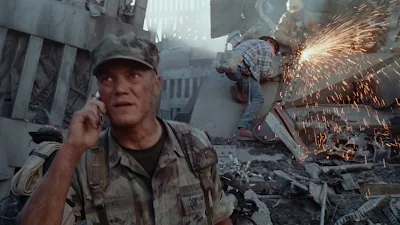This is not a political film
That was the mantra Oliver Stone reportedly repeated to himself while making his latest feature -- the idea being to show what happened on September 11, 2001, when two passenger jets hit the Twin Towers and sent them tumbling down. "The details are the details are the details," he says, having been told in no uncertain terms by producers Michael Shamberg and Stacy Sher (who gave him the aforementioned mantra) to keep the paranoid conspiracy theories to a minimum (JFK anyone?) and stick to facts.
The filmmakers do up to a point; they use blueprints, computer simulations and laser-measuring technology to recreate exactly how the buildings fell; hire Will Jimeno (one of the two survivors) as special consultant; interviewed anyone and everyone short of the Taliban even remotely connected to the disaster ("It's to the point where he drives me crazy, trying to get things right," Jimeno says about the details-obsessed Stone).
The result-- well, not too bad. Stone has fashioned a "man in a hole" story about as well as can be told: the everyday morning that opens just like any other morning; the elliptical indications that something bad has happened; the numb ride to the scene of the disaster; the frightening walk through the sub-basement, with thousands of tons of steel and glass moaning plaintively above the rescuers.
The collapse itself is disappointing--the digital effects don't seem any more realistic than old-fashioned blue-screen effects were in Earthquake and the Airport movies, and the film fritters away much of the tension and mounting sense of claustrophobia by cutting to police officers' wives biting their nails and waiting for bad news (Alfred Hitchcock-- who has never met an enclosed space he didn't like-- would have spent a little more quality time down in the rubble with survivors).
Nice bit of filmmaking despite my reservations, and if it were the story of the survivors of any other kind of disaster I'd leave it at that, but it isn't; the event turned the direction of the United State's foreign policy completely around and led them down the hard and stony path to Iraq, where-- if President George W. Bush has anything to do with it-- they'll stay for years to come. And you don't get a sense of any of that in the film-- you don't get the warnings given by intelligence groups (which the government blithely ignored); you don't get the Bush administration's cluelessness with regards to the world at large and the Middle East in particular; you don't get the flatfooted way the Air Force was caught unaware by a quartet of straying planes; you definitely don't get much sense of the militant nationalism and intense xenophobia that swept across the country-- the true legacy of 9/11. Stone says "And I think one of the benefits of this movie is that it reminds us of what actually happened that day, in a very realistic sense." How realistic is it to look at the world through a peephole?
World Trade Center for all its determination to be authentic bears more than a passing resemblance to Mel Gibson's anti-Semitic snuff flick. Stone's movie focuses on two survivors to the exclusion of all else, ignoring the greater tragedy: the unthinking anger that drove the government to ignore facts and invade Iraq. The impression you get is that the American people (represented by Jim McLoughlin (Nicholas Cage) and Will Jimeno (Michael Pena)) have been buried in rubble, survived, will ship out to collect payback. Not political? It's every bit as political in what it fails to say as Michael Moore's Fahrenheit 911 and even more insidious-- by presenting itself as an 'apolitical drama' it has the power to persuade the unconverted (or just plain clueless).
Doesn't help matters that Stone decides to include the character of Dave Karnes (Michael Shannon) an ex-Marine who seems to receive extra-sensory vibrations (or just heartburn?), goes to New York, starts sniffing around for survivors. "I don't think you guys realize this but this country is at war," he declares with ominous understatement; he looks ready to wreak Biblical vengeance on the Sanhedrin-- sorry, Iraqis. Karnes is a real person-- Stone added the end title that the man served two terms in Iraq because preview audiences were so sure he was made up-- but that doesn’t excuse the blatant cartoonishness. "Someone's going to pay for this," he says, with all the solemnity of Lieutenant Frank Drebin. Couldn't Stone if he had to do this push the camp level up a notch, make the satire clearer, maybe remove the end titles affirming the character's authenticity? Or does Stone actually believe what this character is saying?
Either way, the movie just cries out for a counter image, a cold draught or breath of fresh to clear the fog of emotion. Myself I'd include footage of Bush in a classroom, listening to a schoolteacher's story, being told in a whisper that the country is under attack; President Dubya sitting there, unwilling--or unable--to cope with what's happening in the world at large.
(First published in Businessworld, 10/20/06)


No comments:
Post a Comment